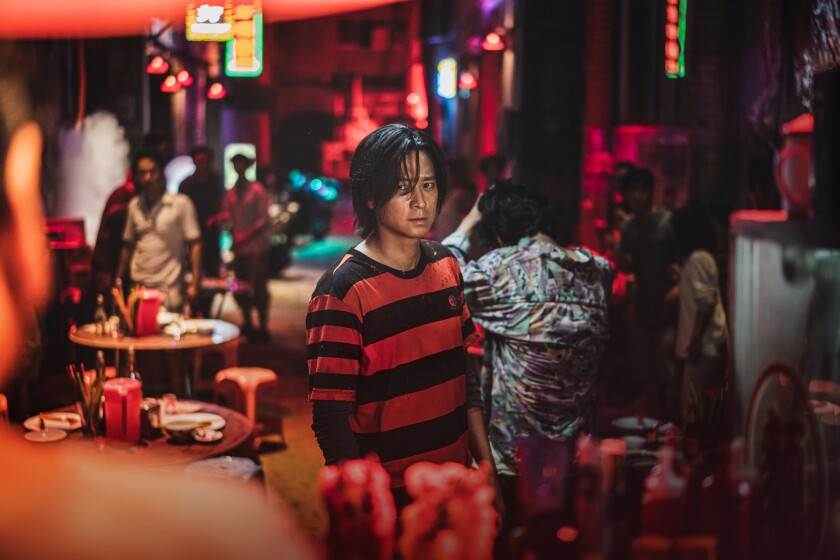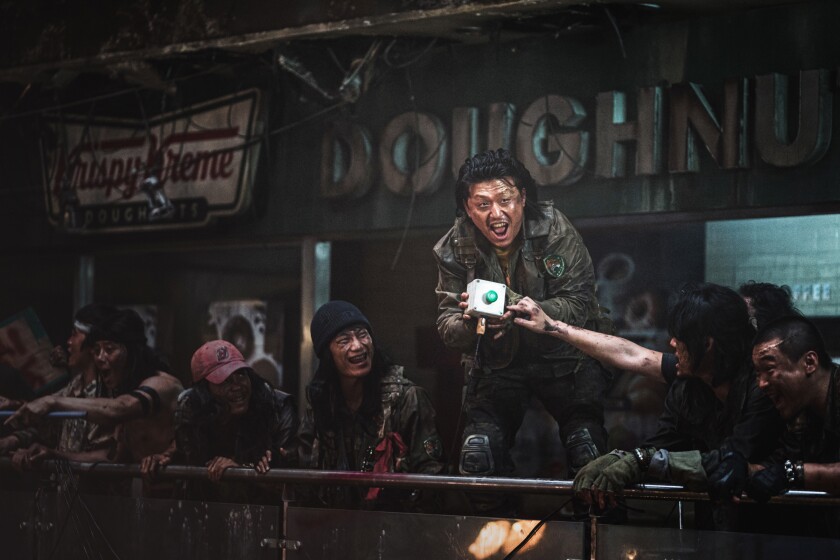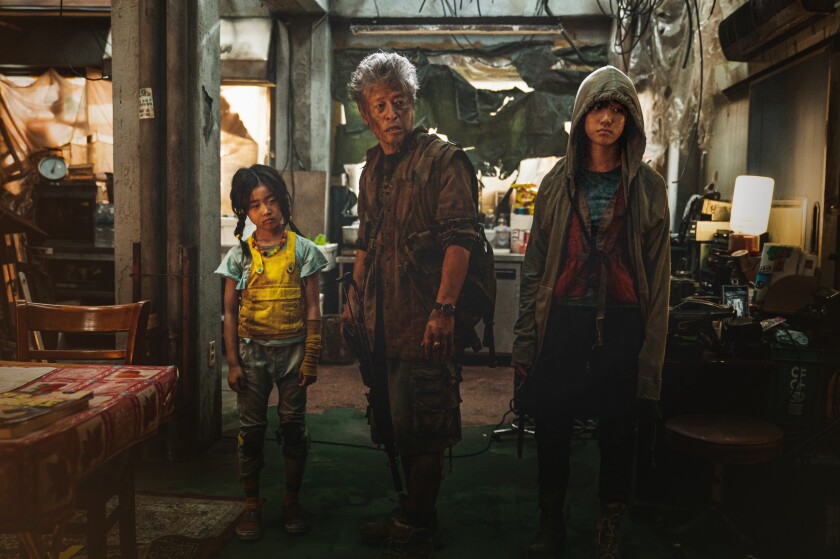The Los Angeles Periods is fully commited to examining new theatrical movie releases all through the COVID-19 pandemic. Because moviegoing carries inherent risks all through this time, we remind readers to adhere to health and basic safety guidelines as outlined by the CDC and area health officials. We will carry on to be aware the many techniques readers can see every new movie, such as generate-in theaters in the Southland and VOD/streaming selections when obtainable.
These times it can be oddly comforting to settle in for a movie like “Peninsula,” the 3rd entry in the “Train to Busan” horror franchise. Set in a bleak long run teeming with rabid zombies and even far more bloodthirsty poor men, the sequel is a stab at entire world-increasing that veers off the rails as it reaches for dazzle around depth, rounding out the hit movie collection someplace concerning a whimper and a bang. But amid all the firefights and automobile chases and persons-munching action, it nails some truths of the genre: Zombies are easy creatures with easy, uh, wants. It is human beings who complicate issues.
Most of director Yeon Sang-ho’s slick sci-fi vision is just plenty of removed from our own pandemic actuality to serve as a welcome escape from 2020’s kaleidoscope of horrors. In a prologue established early in the epidemic on the heels of the commuter chaos of “Train to Busan,” we meet up with Maritime Capt. Jung-seok (Gang Dong-won, “Haunters”) as he flees the country with his sister and her family. He would make a panicked conclusion that will come back again to haunt him — but not as substantially as the tragedy that unfolds on their escape boat to Japan, exactly where unidentified to the travellers the virus has created its way aboard.

Gang Dong-won as Jung-seok in “Peninsula,” the 3rd movie in the “Train to Busan” zombie franchise.
(Well Go United states of america)
4 years later on, Jung-seok is amid a group of expats living in squalor in Hong Kong. What applied to be South Korea is now a zombie-infested fallen nation siloed away from the relaxation of the entire world, which we study in a clumsy little bit of exposition by glib white Westerners on a speak demonstrate. Blamed for the virus, the Koreans endure open xenophobia and discrimination — an eerily prescient parallel to authentic everyday living in the age of corona. Life is so depressing that when a tantalizing Present Also Excellent To Be True sends Jung-seok, his brother-in-legislation Chul-min (“The Wailing‘s” Kim Do-yoon) and two other desperate refugees back again to their homeland to retrieve a misplaced cache of cash, the plan does not seem fifty percent-poor.
As it turns out, it’s a awful plan. Points go south promptly, which is exactly where director Yeon commences to have enjoyment pushing the boundaries of the entire world of “Busan.” With an military of VFX artists at his disposal and cinematographer Lee Hyung-deok lensing the fake-dirty sets in an synthetic sheen, he throws open the doors of his cinematic universe into a new dystopian landscape in which the countless sea of faceless zombies, with their terrifying velocity, hunger for flesh and heightened senses, are not definitely the kinds to be worried of.
That distinction goes to the armed militia occupying a fortified outpost in the coronary heart of Incheon (not to mention the opportunistic international gangsters guiding the mission). Prolonged in the past abandoned by their own superiors, the soldiers, led by the suicidal-depressive Capt. Seo (Koo Gyo-hwan) and the sadistic Sgt. Hwang (Kim Min-jae), have fashioned a nihilistic subsociety from the ashes, scavenging for materials and pitting prisoners vs. zombies for sport. In this article at Device 631, despair has created barbarians of those who once served their country. And who can entirely blame them, the movie suggests, in subtext we’re seeing mirrored these days: Faced with the unthinkable, how would any of us, any nation or persons, endure the ultimate stress take a look at?
Regrettably, attempts at even bigger-image social commentary in the script by Yeon and Ryu Yong-jae tumble quick of the bar established by each 2016’s fantastic “Train to Busan” and the sublimely nuanced “Seoul Station,” the feature-length animated prequel Yeon created in the exact 12 months. “Seoul Station,” a scathing indictment of economic exploitation and neglect, follows as the epidemic is initial unleashed amid a community’s tragic absence of empathy. In “Train to Busan,” selfishness and company greed sharply mix to accelerate and exacerbate the literal dehumanization of the population.
In ramping up the stakes for his trilogy ender, Yeon aims for the rafters but neglects to meaningfully fill the area, unleashing lesser-compelling personalities and derivative plot turns upon the wide-open ruins of weightless, overly-CG cityscapes though gesturing towards grander geopolitical implications that never cohere.

In the ruins of a former buying centre, the barbaric Sgt. Hwang (Kim Min-jae, centre) potential customers a device of marauding former soldiers in “Peninsula.”
(Well Go Entertainment)
Greater isn’t far better, even if some sets, like the zombie-baiting arena built in the ruins of a buying shopping mall, established the stage for dynamic battle sequences. Absent the story progress to match, “Peninsula‘s” supersized scale far more typically commences to drown its characters before the zombies get a probability to end them off. A single longs for the claustrophobic tension-cooker confines of that zombie-infested prepare.
Alternatively, “Peninsula” revels in rapid-paced established items, such as a amazing twenty-minute predawn automobile chase, though painting its characters in wide strokes. The benefits come to feel ploddingly familiar. At occasions it recalls two different “Mad Max” movies (“The Road Warrior” and “Fury Road”), George A. Romero’s zombie sequel “Land of the Useless,” and, refreshingly, the “Fast & Furious” flicks. The previous turns out to be one of the film’s brilliant places, livening up a serviceable plot when a young lady guiding the wheel of a dashing automobile coolly Tokyo Drifts via hordes of zombies like the newest member of Dom Toretto’s squad.
The young drift queen’s name is Jooni (performed by 14-12 months-old actress Lee Re), and with her precocious very little sister Yu-jin (Lee Ye-won), a pint-sized RC automobile obsessive, she zooms into the image just in time to steal the movie. If only the movie focused far more on how these children and their tricky-as-nails mom, Min-jung (Lee Jung-hyun), survived the zombie-ravaged wasteland in the initial area, or how they shaped a makeshift family device with the elderly Mr. Kim (Kwon Hae-hyo), the grandfatherly ex-navy officer still holding out hope for rescue.

Lee Ye-won as Yu-jin, remaining, Kwon Hae-hyo as Mr. Kim and Lee Re as Jooni in “Peninsula.”
(Well Go Entertainment)
The 115-minute runtime instead hangs on the shoulders of movie star Gang, who does his best to convey the torture of a gentleman driven by a obscure perception of … guilt? Reduction? It is under no circumstances very clear nor enjoyable. As he guns his way via “Peninsula’s” dystopian action racking up zombie headshots, an overwrought score trumpets the emotional stakes with the subtlety of a Michael Bay blockbuster, as if Yeon does not have confidence in the story to land with any pounds on its own.
“Peninsula” squanders an in any other case powerful zombie metaphor by serving up much considerably less to chew on than its predecessors. The franchise is far more prosperous when it illustrates in human moments how an apocalypse may force us to pick the person we want to be. Acquire a cue: Use a mask, clean your hands, be kind to others — and look at “Seoul Station” in its place.
‘Peninsula’
(In Korean with English subtitles)
Not rated
Working time: one hour, fifty six minutes
Participating in: Vineland Push-In, City of Industry, and in standard launch exactly where theaters are open





More Stories
Unique Facts About Cultural Diversity of India
Art is a Reflection on Society – A Perspective
Far-Jap Artwork – Cynical Realism – An Exponent of Present-day Chinese Artistry